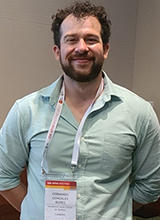Ambassadorship creates opportunity to develop connections within the next generation of neurochemists
 As a new ambassador of the International Society for Neurochemistry (ISN) Young Scientist Steering Committee (YSSC), PhD candidate Fernando González Ibáñez (Tremblay Lab) will spend the next year organizing events to create a network of young scientists in the neurochemistry field.
As a new ambassador of the International Society for Neurochemistry (ISN) Young Scientist Steering Committee (YSSC), PhD candidate Fernando González Ibáñez (Tremblay Lab) will spend the next year organizing events to create a network of young scientists in the neurochemistry field.
We caught up with Fernando to learn more about his ambassadorship.
What inspired you to apply for this ambassador program?
I really enjoy networking. I think I am good at it. This ambassador program allows me to develop and strengthen a working network with my peers in Canada and Mexico, my home country. There are many benefits to knowing the other people contributing to my field.
The ambassadorship program also gives me tools to increase the reach of ISN. Science can be tough, but belonging to a society can be very beneficial and supportive. I have attended two biannual ISN meetings – first in 2019 in Montreal and second in 2022 in Hawaii. My experiences with the ISN were incredible. For both meetings, I was awarded a travel grant. At the Hawaii meeting, I was chosen to participate in the young researchers’ symposium, where I presented the results of my PhD research and the interesting results I’ve gathered during my time in the lab of Dr. Marie-Ève Tremblay. Something I also enjoyed was that I was able to see the people I met in Montreal again in Hawaii. It’s like meeting with old friends. Likewise, making new contacts is very motivating. During the last meeting, I was able to meet with neuroscientists from Latin America and Africa. We discussed specific issues like being an immigrant researcher and how we can create spaces and collaborations that benefit a more diverse group of researchers.
What sort of events would you like to organize?
For my first term as an ambassador, I would like to organize an event at UVic promoting the benefits of belonging to the ISN. The society has a lot of grants for different purposes, like research internships and travel awards. I also plan to organize a webinar. I’d like to invite a guest neuroscientist to give a virtual talk at a university in Mexico (hopefully the one where I completed my bachelor’s degree, Universidad Autónoma de Baja California in Ensenada). My goal is to offer young scientists a peek at the kind of questions neuroscience is trying to answer and hopefully motivate them to pursue a career in this field.
Why is it important to create a network of young scientists through these events?
There are many reasons, I think. One of them is that these young scientists are your contemporary colleagues. Science is a collaborative activity and trust is important. There is an advantage of knowing people that may have similar interests and that you enjoy working with.
How many other ambassadors are you working with?
Right now I am working solo, as I am just starting. I have reached out to the other ambassadors to exchange ideas on the events we are planning. As I gain confidence, my goal would be to have an activity with other ambassadors in Canada or with other researchers who are ISN members.
Anything else you would like to share?
This ambassadorship program is an exciting opportunity. I think of how I would have benefited from belonging to a society in earlier stages of my career, and now I can actually create this opportunity for young researchers.
